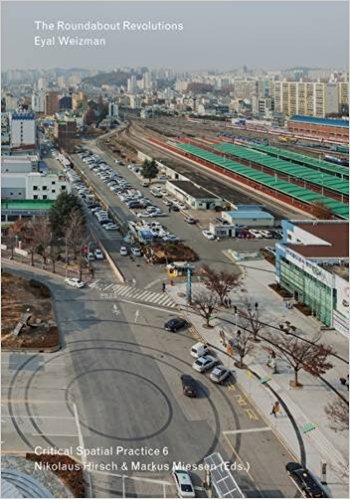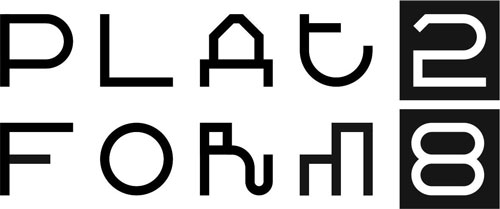
Critical Spatial Practice #6: The Roundabout Revolutions
July 2015
By Eyal Weizman
One common feature of the wave of recent revolutions and revolts around the world is not political but rather architectural: many erupted on inner-city roundabouts. In thinking about the relation between protest and urban form, Eyal Weizman starts with the May 1980 uprising in Gwangju, South Korea, the first of the roundabout revolutions, and traces its lineage to the Arab Spring and its hellish aftermath.
Rereading the history of the roundabout through the vortices of history that traverse it, the book follows the development of the roundabout in Europe and North America in the early twentieth century, to its subsequent export to the colonial world in the context of attempts to discipline and police the chaotic non-Western city. How did an urban apparatus put in the service of authoritarian power became the locus of its undoing?
Today, as the tide of revolt that characterized the Arab Spring seems to ebb, when nations and societies disintegrate by brutal civil wars and military oppression, the series of revolutions might seem like Dante s circles of hell. To counter this counter-revolution, Weizman proposes that the immanent power of the people at the roundabouts will need to find its corollary in sustained work at round tables the ongoing formation of political movements able to enact political change.
The sixth volume of the Critical Spatial Practice series stems from Eyal Weizman s contribution to the Gwangju Folly II in 2013, an exhibition curated by Nikolaus Hirsch with Philipp Misselwitz and Eui Young Chun for the Gwangju Biennale. Weizman and the architect Samaneh Moafi constructed a folly composed of seven roundabouts and a round table in front of the Gwangju train station, one of the central points in the events of May 1980.
- Bracket 2: Goes Soft
- Cities: X Lines: Approaches to City and Open Territory Design
- City Sense and City Design: Writings and Projects of Kevin Lynch
- City Transformed: Urban Architecture at the Beginning of the 21st Century
- Collage City
- Combinatory Urbanism : A Realignment of Complex Behavior and Collective Form
- Critical Spatial Practice #6: The Roundabout Revolutions
- Delirious New York: A Retroactive Manifesto For Manhattan
- Designing Cities
- Event Cities 02
- Event Cities 03
- Event Cities 04
- Fast-Forward Urbanism: Rethinking Architecture's Engagement with the City
- Garden Cities of Tomorrow
- Going Public: Public Architecture, Urbanism And Interventions
- Heterotopia and the City: Public Space in a Postcivil Society
- La rue est à nous... tous! ( The street belongs to all of us! )
- Made in Tokyo: Guide Book
- Masterplanning the Adaptive City: Computational Urbanism in the Twenty-First Century
- Measuring The Non-measurable 02: Tokyo/bangkok/singapore
- Measuring The Non-measurable 03: Mn'm Workbook 1
- Measuring The Non-measurable 04: Mn'm Workbook 2
- Measuring The Non-measurable 05: Post-souvenir City
- Measuring The Non-measurable 06: Subjectivities In Investigation Of The Urban
- Measuring The Non-measurable 07: Mn'm Workbook 3
- Measuring The Non-measurable 08: In The Search Of Urban Quality
- Megastructure Reloaded: Visionary Architecture and Urban Planning of the 1960s Reflected by Contemporary Artists
- Monu #13 Most Valuable Urbanism
- Monu #14 Editing Urbanism
- Monu #15 Post-ideological Urbanism
- Monu #16 Non-urbanism
- Monu #17 Next Urbanism
- Monu #18 Communal Urbanism
- Monu #19 Greater Urbanism
- Monu #20 Geographical Urbanism
- Monu #21 Interior Urbanism
- Monu #22 Transnational Urbanism
- New City Spaces
- Points + Lines: Diagrams and Projects for the City
- Public Space
- Recombinant Urbanism: Conceptual Modeling in Architecture, Urban Design and City Theory
- S,M,L,XL
- Self-Sufficient City
- Small Scale: Creative Solutions for Better City Living
- Sociopolis Project for a City of Future
- System City: Infrastructure and the Space of Flows
- The City In The City: Berlin: A Green Archipelago
- The City, Seen as a Garden of Ideas
- The Death And Life Of Great American Cities
- The Endless City: The Urban Age Project by the London School of Economics and Deutsche Bank's Alfred Herrhausen Society
- The Exposed City: Mapping the Urban Invisibles
- The Public Chance: New Urban Landscapes
- The Self-Sufficient City: Internet has changed our lives but it hasn't changed our cities, yet.
- The Superlative City: Dubai and the Urban Condition in the Early Twenty-First Century
- Urban Future Manifestos
- Urban Intensities: Contemporary Housing Types And Territories
- Urban Solutions: Building Solutions, Green Solutions, Culture and Research
- Urbanity: Twenty Years Later: Projects for Central European Capitals
- Verb Connection
- Writing Urbanism: A Design Reader (The ACSA Architectural Education Series)
- Young-Old: Urban Utopias of an Aging Society


